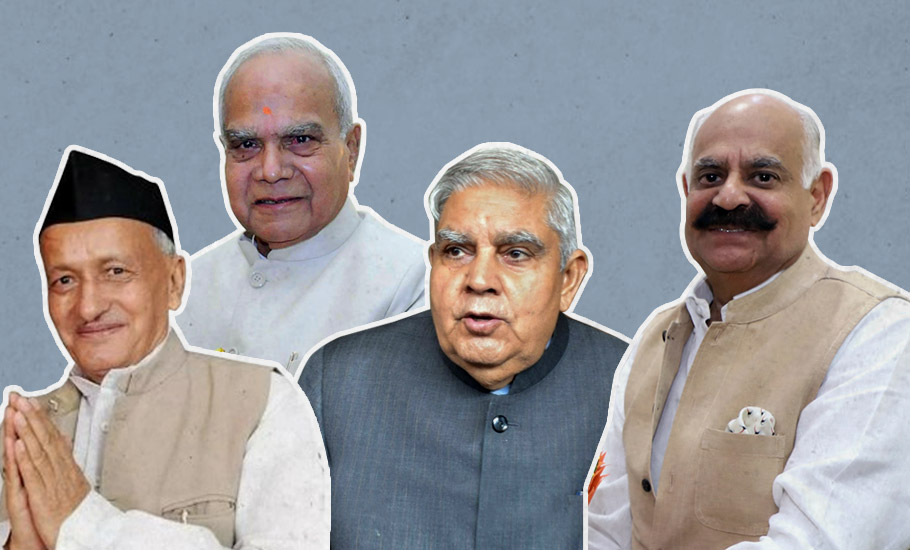
Governors Vs states – Delhi ‘sultanate’ back amid growing sense of bias

When Maharashtra Governor Bhagat Singh Koshyari wrote to Chief Minister Uddhav Thackeray a few days back questioning his “secularism” on reopening of religious places amid COVID-19 situation, Koshyari was treading a dangerous constitutional path, though his contemporaries, all ruling BJP appointees, have done so to a great harm to the Constitutional post.
Koshyari’s role prior to Maha Vikas Aghadi government of Shiv Sena, Congress and the NCP had come into question when he first appointed Devendra Fadnavis of BJP as CM, though he had clearly lacked a majority. When Fadnavis failed in his attempt to form a government and his “deputy” Ajit Pawar walked back into the NCP camp, the Governor’s political predilection stood thoroughly exposed.
Then we have the West Bengal Governor Jagdeep Dhankar, whose running battles with Trinamool Congress Chief Minister Mamata Banerjee are well known; to an extent that the prestige of the Constitutional post that he holds seems lost as his actions haven’t made any effect. So much so that when Dhankar recently messaged/called the CM’s office and top police officers following the daylight murder of a local BJP leader, he received no response.
Look at the state of affairs across the country in non-BJP states – especially in Punjab, Rajasthan, Chhattisgarh, and Tamil Nadu — you’d notice a general trend of governors trying to interfere in the state government functioning in overriding their decisions.
Related news: Anyone with self-respect would leave governor’s post: Pawar’s dig at Koshyari
In Punjab, the state parties on Tuesday (October 20) passed a resolution and cleared three bills to counter Centre’s farm laws. Chief Minister Capt Amarinder Singh said in the Assembly that he very much suspects the Bills’ passage by the governor. But he asserted that he “is not afraid of being of dismissed.”
In Tamil Nadu, the NEET is at the centre of a political storm. This year the issue is related to the state government’s Bill to reserve 7.5% of its medical seats for government school students. The Bill was passed with the support of all parties in the House. Tamil Nadu has protested against the NEET from day 1. The argument against it is that it disadvantages even bright students from poor and rural backgrounds.
The ruling AIADMK government made serious efforts to keep a level playing field. It has improved textbooks significantly to bring them on par with the CBSE syllabus. The government’s students’ quota is another attempt to ensure that poor and rural students can become doctors. However, this has been held up by the state governor who is yet to give his assent to the Bill.
The state revealed this to the Madurai Bench of the Madras High Court. The state assured the court that the medical prospectus will not be issued till the assent is given.
Days later, the NEET results were announced in which the structural barriers compounded by the pandemic were laid bare: Only 1,633 students from government and aided schools, whom the state coached, cleared the test in their first attempt as against 2,557 last year.
All this of course coincides with the appearance of a single party with a comfortable majority at the Centre. During the last few years, the governors of Karnataka, Madhya Pradesh, Kerala, Maharashtra and, of course, West Bengal have played their roles in such a way as to make them highly controversial without necessarily adding to the glory of the office.
Related news: Bengal governor independent probe, white paper on ‘medical scam’
The result is growing Centre-state bitterness, a sense of discrimination among states and consequent interference in the functioning of the democratically elected state governments. This has led to a fractious flux in which people’s mandate is allegedly subverted. It’s the Delhi ‘sultanate’ versus the state government authority which is sought to be projected to allege wanton discrimination. Who is the loser? Obviously, the people of India.
The constitutional position is clear: While the President is elected by the representatives of the people, namely, the MPs and the Members of the State Legislatures, the Governor is merely appointed by the President, which really means, by the Union Council of Ministers.
The negative image of the state governors as above all “an agent of the Centre” has proved difficult to erase. The present controversies have been around the issues of selecting the chief minister, determining the timing for proving legislative majority, demanding information about day-to-day administration, taking apparently long time in giving assent to bills or reserving bills for the President, commenting adversely on specific policies of the state government and exercising powers of the governor as the chancellor of state universities.
The constitution empowers the governor to reserve a bill for the President’s consideration. This is an important ‘discretionary power’ which is necessary for the governor to make sure that state’s laws fall within the framework of the Constitution. But such gubernatorial interference would be necessary only very rarely and the expectation, contrary to the reality, is that its procedure should not be misused to ‘cold storage’ a bill fairly passed by the state legislature.
It is necessary to remember that the office of the governor under the constitution of independent India is altogether different from the provincial governors of the Maurya, Mughal or British empires. Dr. Ambedkar had said, “I have no doubt in my mind that discretionary power is in no sense a negation of responsible government. It is not a general clause giving the governor power to disregard the advice of his ministers in any matter in which he finds he ought to disregard.”
Related news: Nagaland governor makes CM Rio scapegoat for Centre’s failure

